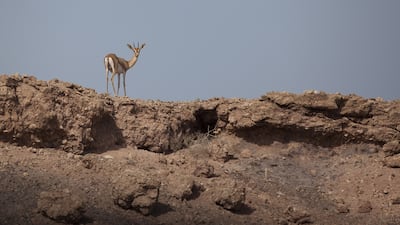ABU DHABI // The Ministry of Environment and Water has designated five UAE marine and coastal habitat sites as areas having global significance.
The south-west waters of Abu Dhabi, the Marawah Marine Biosphere Reserve, Jebel Ali, Sir Bu Nair Island and Khor Kalba were all recognised for their rich and unique biodiversity at a regional workshop in Dubai discussing biologically and ecologically significant marine areas in the Arabian Gulf and north-west Indian Ocean.
“By recognising their aquatic ecological importance, we are highlighting the significance of conserving the open oceans and high seas for the survival of all marine species,” said Mariam Hareb, the Acting Assistant Undersecretary for Water Resources and Nature Conservation at the ministry.
The designation seeks to further protect coastal habitats, which in the form of mangroves, seagrass beds, coral reefs and sand flats provide nutrition for and support a variety of migratory and endangered species.
These include the second largest population of dugongs in the world, second only to Australia, in the Marawah Marine Biosphere Reserve located off the coast of the Western Region, as well as endangered hawksbill turtles in the south-west waters of Abu Dhabi, Sir Bu Nair Island off the coast of Sharjah and the Jebel Ali region in Dubai.
The coral reefs off the coast of Jebel Ali are also home to several dolphin species such as the Indo-Pacific bottlenose and humpback.
Among those who attended the workshop was Marina Antonopoulou, the marine programme manager at Emirates Wildlife Society – World Wildlife Fund, who said the meeting was a great regional effort that resulted in important outcomes for protected areas in the UAE and the region.
“Identifying these areas is a very good step towards better marine management. More so, it is important to commend the ministry and the country on facilitating such a workshop,” she said.
Although the designation was a step in the right direction, Ms Hareb said, more work needs to be done to save the UAE’s ecological system from further degradation.
Dr Aaron Bartholomew, an environmental scientist at the American University of Sharjah, said some of the designated areas had already been negatively affected by projects.
“Unfortunately these developments are directly or indirectly affecting some of these sensitive areas,” he said.
Having researched and dived the Jebel Ali corals before the commencement of the Jebel Ali Waterfront construction, Dr Bartholomew said he hoped the designation would save the remaining corals not yet affected by the development.
He said areas such as Khor Kalba’s mangrove forest – home to native species of birds, crabs, molluscs and reptiles – had previously not received adequate protection, but were increasingly being better guarded.
Even though the construction of hotels in the area to promote eco-tourism concerned Dr Bartholomew, he said the projects could have a positive effect as long as efforts to protect the habitat were made.
He said the ministry’s designation would help efforts being made to preserve these critical habitats.
“Preserving these habitats will benefit the country by not only protecting them, but also have a positive economic effect through providing fish for fishermen and increasing tourism to the region,” he said.
Hosted by the Ministry of Environment and Water, the workshop was also attended by representatives from Kuwait, Oman, Qatar, Saudi Arabia, Iraq, Iran, Egypt, Jordan, Sudan, Eritrea, Pakistan, India and international and regional organisations.
tsubaihi@thenational.ae

